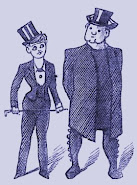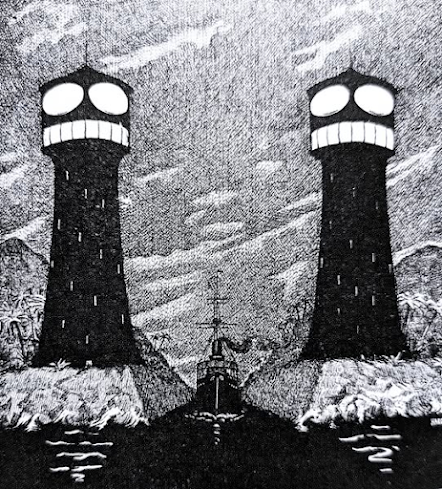I:Political Cartoonists Have Reflected (and Moved) Events, Decisions, and... History
by Rick Marschall
Politics and cartoons have not always been ingredients in an adversarial recipe. This drawing from PUCK is about a politician (publisher William Randolph Hearst) and his own cartoon characters, stars in his chain of newspapers. In 1904 he sought the Democrat Party nomination for President; he would have run against the incumbent Theodore Roosevelt. Around him are the creations of F Opper, Rudolph Dirks, James Swinnerton, and Carl Schultze.
I recently returned from Washington DC, the Inauguration and related events, and while this will be old news to any who read this after it is archived, it will not be a news report. I was inspired, if that is the right word, to share a little history of presidents and cartoons. Campaigns and commentary by comic artists. It will run over several postings.
Editorial
cartooning, specifically politically cartooning, thrives at times of
urgent public debates and vivid personalities.
This
statement sounds trite or self-evident, barely a thesis except that –
in a corollary of the “Great Man” theory of studying
history –
urgent public debates and vivid personalities sometimes are shaped
and propelled by speeches, tracts… and cartoons.
The
timing and the passions of the Revolutionary War, the French
Revolution, the Spanish-American War, the New Deal, and various
anti-war movements all mightily were influenced by cartoons and
cartoonists.
Cartoons not only reflected events but have influenced history. Napoleon said that history was written
by the victors – and
it is just as true that our views of history often have been shaped
by artists, including cartoonists.
The legendary Thomas Nast, a self-caricature, sharpening his most lethal weapon, a pencil. His support of the North in the Civil War, and of President Abraham Lincoln, earned the latter's honorific, "The North's Greatest Recruiting Sergeant." On the other hand, his vicious cartoons against Democrat presidential candidate Horace Greeley helped defeat U S Grant's opponent in 1872. Greeley died only days after the election.
Much
of what we think – and know; or think we know – of kings,
presidents, generals, candidates, and leaders of movements, has been
codified by cartoonists. Oftentimes, major figures in history have
been portrayed to their detriment. Sometimes
unfairly, sometimes falsely, often spot-on. No matter: our general opinions of: say, Andrew Jackson or Williams Jennings
Bryan frequently are what the cartoonists said through their art.
Consider
Theodore Roosevelt and Richard Nixon. Do we “know” them through
their portraits? Speeches? Caricatures? Truth?
Generalizations? Slander? Gossip? Facts? Cartoonists work on the
blank slates of daily journalism in ink, but might as well carve in
stone.
King
Tut: What do we know of how he lived and loved? But his image
endures. We have thousands of hours of Nixon on film, yet we remember
him mostly through the cartoons of Herblock.
… Anyway,
it was once so. Henry Major, a caricaturist of an earlier generation, noted that cartoonists more than occasionally were thrown in jail for what they drew.
He said that later cartoonists should be arrested for what they don’t
draw. If we return to our thesis – that political cartooning
thrives during times of urgent debates and vivid personalities, and
vice-versa – then we might well be entering a new Golden Age of
political cartooning.
Time
will tell, but signs are at hand. The Trump presidency, indeed the
Trump phenomenon, provides an unprecedented opportunity for political
cartoonists to spread their ink-stained wings as seldom before. Stand-up comedians and cable-news wiseguys have stolen a lot of cartoonists' thunder... but, really, only to the extent that artists and newspapers have weakened their platforms and surrendered their turf.
To
appreciate the art form of the political cartoon, as much as to
contextualize the opportunity presented by Trump, it is instructive
to survey the history of political cartooning in America. We will see
that the most powerful and memorable – and prescient – work has
been at times when vivid personalities have predominated. Whether
cartoonists have accurately or satirically recorded, or helped
create, their victims, is an open question. That questions is as
intractable as the chicken-or-egg conundrum.
Our
job – as citizens, commentators, voters – is to appreciate and
learn from this amazing art form of graphic humor, variously called
“Wordless Journalism,” the “Ungentlemanly Art”: the political
cartoon.
At
a conference held by the American Association of Editorial
Cartoonists in the mid-1970s, Meg Greenfield of the Washington
Post
addressed the assembled cartoonists and thanked them for providing
“laughs” and “morning chuckles.” The assembled cartoonists
mostly were outraged. After investing in careers as pictorial
commentators they were being dismissed as court jesters. False News. By the Washington Post of all institutions (surprise, surprise in view of recent events? See the recent travails of cartoonist Ann Telnaes, chronicled in these columns) .
Several times in American history, there were calls to restrict and even censor, political cartoons. Sometimes these calls, by politicians of course, became legislative proposals. These bills never became laws. Spangler, Montgomery Advertiser, in the 1910s. The most serious of these efforts occured in Pennsylvania about the same time, by an aggrieved Senator Pennypacker.
It
was outrageous that someone from the staff of the newspaper home of
Herblock could so totally misunderstand the unique gift – yes, art
form –
of the political cartoon. Maybe cartoonists make their points through
laughs. But that one creative tool among many others, is
not the only special attribute of cartoons – there is the ideal of
truth itself.
Next: The birth of American political cartoons, and the early American cartoonists Benjamin Franklin and Paul Revere.
































